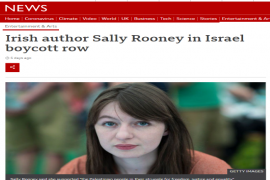1) At the JCPA, Yoni Ben Mehachem takes a look at a topic much neglected by the BBC: Fatah’s internal politics.
“The succession battle in the Palestinian Authority has become very elemental since Mahmoud Abbas rejected the request of four Arab states – Egypt, Jordan, Saudi Arabia, and the United Arab Emirates – to mend fences with his bitter rival Muhammad Dahlan. Some of those states want to see Dahlan as the next PA chairman.
Although some in Fatah view Abbas’ rejection of the Arab request as an act of “political suicide,” Abbas does not show signs of stress. At the urging of Egypt and Jordan, which fear Hamas, he called off the elections in the territories and consented to a return to Fatah by some of Dahlan’s people. As far as Abbas is concerned, he has complied with most of Egypt and Jordan’s requests. Yet, still, he is not prepared to countenance Muhammad Dahlan.”
2) The Times of Israel’s Avi Issacharoff reports on another Palestinian succession battle likewise ignored by the BBC to date.
“Many people consider Haniyeh the leading candidate to succeed incumbent Khaled Mashaal, 60, primarily because of where he lives — Gaza. Running against him is Moussa Abu Marzouk, 65, who already was the head of the political wing (1992-7), is now Mashaal’s deputy (along with Haniyeh), and is considered a close associate of groups belonging to the Muslim Brotherhood’s global network.
There is a third candidate, too, well known to every Hamas activist in Gaza, the West Bank, and abroad. His name is Khaled Mashaal.
As Palestinian commentators point out, Hamas’s constitution prevents Mashaal being re-elected again. But anything is possible when it comes to Mashaal (Abu al-Walid), who has held the post for 20 years. Hamas may have a hard time saying goodbye to him, almost as hard as Mashaal would have in saying goodbye to the job. As head of Hamas’s political wing, he enjoys extraordinary status not only among the Palestinians but also throughout the Middle East and the Muslim states. He and his relatives are believed to have accrued considerable property and wealth in Qatar.
Will he be prepared to step down? Quite a few experts doubt it.
And quite a few experts question whether the Hamas election process is going to much resemble democracy in the first place.”
3) At the Washington Post Professor Eugene Kontorovich writes about “Why the U.N.’s Israel obsession should worry even people who don’t care about Israel”.
“Everyone knows the U.N. spends a disproportionate time on Israel, but the data reveal that even within resolutions, it uses a unique legal vocabulary for the Jewish state. The scale of the difference is quite striking. […]
Since 1967, General Assembly resolutions have referred to Israeli-held territories as “occupied” 2,342 times, while the territories mentioned above are referred to as “occupied” a mere 16 times combined… Similarly, Security Council resolutions refer to the disputed territories in the Israeli-Arab conflict as “occupied” 31 times, but only a total of five times in reference to all seven other conflicts combined.”
4) At the Tower, Professor Gerald Steinberg reflects on the fifteen years since the Durban Conference.
“For many observers, the “Durban Strategy” marked the coming-out party for a “new anti-Semitism.” Unlike more traditional forms of anti-Semitism, which were by nature more overtly religious or racial in their blatant discrimination towards Jews, new anti-Semitism conceals the millennia-old hatred in a contemporary package, one better suited for a 21st-century audience. This anti-Semitism exploits the language of universal human rights and civil society, with NGOs publishing false and distorted allegations regarding Israel, and creating and maintaining double standards that apply only to a single country. New anti-Semitism goes well beyond any notion of legitimate criticism of Israel and its policies, and instead promulgates hateful vilification of the country, its people, and its Jewish character.”




